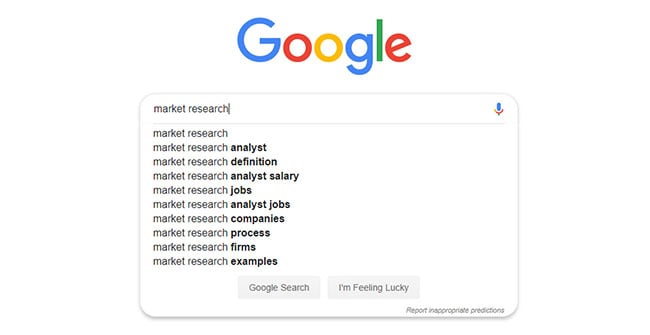
May 16, 2019
Blog Market Research 5 Reasons Why You Can’t Use Google For Comprehensive Market Research
When you want information fast, what do you do? Google it. That’s what we do, too.
We love that Google has democratized information about billions of topics and delivers it to users quickly.
But when the stakes are higher— for example, if you’re a student working on a big project, a venture capital professional making an investment decision or a startup founder trying to find your target audience—a quick (or even extensive) Google search will not give you the reliable information you need.
Conducting web searches for the latest data and insights in your market will not help you make the most informed business decisions or develop the best project for the following reasons:
What about Google Scholar?
For students and professionals alike, Google Scholar can be a useful resource. Why? Because it’s easy to use; highly accessible; allows you to save citations for later; generates results that include a wide variety of media, such as videos, slideshows and notes from conferences; and a host of other reasons.
But when you need to conduct serious, professional market research to make business decisions or work on a school project, Google Scholar just doesn’t cut it. Why? For three big reasons:
Don’t get us wrong. Google Scholar can be a great research tool. But we advise strongly against relying on it as your only research tool.
And if you’re a venture capital, startup and/or corporate professional of some kind, Google Scholar doesn’t hold much weight.
So what resource should you use for market research?
If you need easy-to-find yet highly reliable market research, we recommend using a reputable market research company (like BCC Research!). If you’re a college student, your academic librarian can tell you if your school is subscribed to a collection of market research and how to access it.
Using a company that is dedicated solely to creating high-quality, in-depth research on a variety of markets ensures that you’re accessing the most reliable, up-to-date data on your given market—saving you the time, energy and stress that’s required if you choose to rely solely on Google.
Market research companies take the guesswork out of research. They provide access to the exact reports with the exact data that you need to complete your project, make business decisions, demonstrate to colleagues that you’re plugged into the industry and more.
Why use BCC Research?
Of course, we here at BCC Research are biased because as a market research company, we believe that our library is the best of the best for professionals in the corporate, academic and tech transfer worlds.
While we’re not free like Google (but remember, using Google for market research isn’t the best use of your time), we are well worth the investment. And we don’t just provide market research—we provide ways to make conducting research as easy as possible.
The cost of our research largely depends on the length and scope of the report. Our global market reports are roughly 250-300 pages and undergo an extensive editorial process to ensure accurate and reliable forecasts. We also produce smaller reports that are centered on emerging technologies and markets, and as such, these reports may cost only a $1000 or less.
Lastly, we offer custom research can be scaled to meet your exact needs. If our team has an analyst that matches your specific project requirements, they can conduct custom research to help validate your market assumptions. The cost of custom research begins at just a few hundred dollars, say for a simple graph.
When you’re ready to start making data-driven decisions in your college/university, company or office, browse BCC Research’s library of reports at www.bccresearch.com. For custom inquires, visit our custom research page.
And if you’re a student, your school may already have access to the BCC Research library—just ask your academic librarian!

Amending the Pesticide Trade Business China and the U.S. are the foremost export...

Introduction The electric vehicle (EV) revolution is not solely about batteries ...

In the ever-evolving landscape of technology, pressure sensors have emerged as p...

We are your trusted research partner, providing actionable insights and custom consulting across life sciences, advanced materials, and technology. Allow BCC Research to nurture your smartest business decisions today, tomorrow, and beyond.
Contact UsBCC Research provides objective, unbiased measurement and assessment of market opportunities with detailed market research reports. Our experienced industry analysts assess growth opportunities, market sizing, technologies, applications, supply chains and companies with the singular goal of helping you make informed business decisions, free of noise and hype.